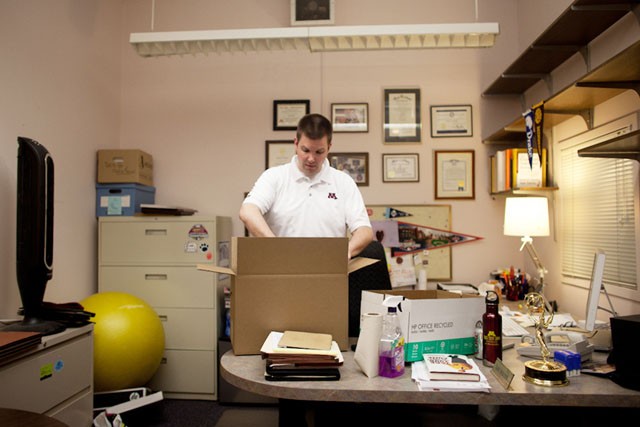The University of Minnesota is getting a new voice.
Less than a month before the UniversityâÄôs president and a slew of vice presidents step down, Dan Wolter is also leaving after more than six years as the University News Service director.
As head of the office responsible for filtering daily requests from local and national media, Wolter is the main link between the UniversityâÄôs administration and the public.
Wolter will leave the University on Friday for a new job, he said. His departure coincides with the transition between President Bob Bruininks and Eric Kaler, who will take over as the UniversityâÄôs 16th president July 1.
Amy Phenix, who will be KalerâÄôs chief of staff, is leading the search for WolterâÄôs replacement. She said she hasnâÄôt begun the search process, but has appointed Patty Mattern, a nine-year veteran of the News Service, as interim director.
With a salary of $115,000 in 2010, the position pays more than the University police deputy chief and most professors.
Personal v. private
During his tenure at the University, Wolter changed the way the University communicates with the public through use of social media, while also drawing attention for his personal use of Twitter.
The University became one of the first schools in the nation to use Twitter as a main channel for public relations.
But some criticized WolterâÄôs use of the site after he posted his own political beliefs on his Twitter account, which he also used to promote the University.
Wolter said he always identified his personal views as separate.
But it can be difficult for a spokesman for a large institution to speak only on his own behalf, said Dave Mona, chairman of the Minneapolis branch of the public relations firm Weber Shandwick.
âÄúYou constantly have to be aware of how youâÄôre perceived,âÄù he said.
The News Service does not have a social media use policy for its employees, but expects good judgment from individuals in separating their own messages from the UniversityâÄôs, Wolter said in an email.
âÄúI think I navigated [the social media] in a way that never reflected poorly on the University,âÄù he said.
Wolter was also scrutinized for serving on the Metropolitan Council while representing the University. His connection to both during litigation over Central Corridor light-rail construction brought questions of a possible conflict of interest. Wolter kept his position on Met Council and was reappointed again in 2007 until his term ended in January.
Wolter describes the job he will leave at the weekâÄôs end as âÄúa constant exercise in diplomacy.âÄù
Prior to coming to the University in February 2005, WolterâÄôs career was heavily concentrated in politics, when he spent years as a spokesman for various political figures, including former Gov. Tim Pawlenty.
Next heâÄôll tackle private industry âÄî heâÄôs leaving the University for a similar job at pharmaceutical giant Pfizer Inc.
âÄòA special obligationâÄô
Contacted daily by the media, Wolter said his office works to accommodate all requests and keep the University open.
âÄúI think we do a relatively good job of that,âÄù Wolter said.
But some disagree.
Chris Ison, an associate professor in the School of Journalism and Mass Communication and a former reporter in the Twin Cities, said the News Service has been more obstructive than helpful to the media.
Instead of allowing easy access to all the information, Ison said, the News Service has tried to funnel everything through its office, often stymieing reporters from getting public information âÄî especially in controversial issues.
Paul Hassen, vice president of public affairs for the Association of Public Land-grant Universities, said that a spokesmanâÄôs job in controversial situations should not be to explain what happened, but only to release facts âÄúas they are known at any given point in time.âÄù
But he also said the job involves promoting the institution and its goals âÄî something Wolter has done extensively by promoting individual success stories within the University.
âÄúMy job is about telling the UniversityâÄôs story,âÄù Wolter said.
The replacement
Phenix said she asked Mattern to step in because sheâÄôs the senior member of the team and is qualified for the time of transition.
The search for a permanent replacement could take up to three months and will begin once other senior administrative positions are filled, Phenix said.
She could not provide any details on the type of candidate the University will look for, and said it is âÄúprematureâÄù to comment before forming a search committee.
Mona said this might be the best time for the position change, as a new administration is likely to have a different agenda.
He said local candidates are best.
âÄúFamiliarity with both the news media and the general public here in the greater Minnesota area âĦ would be important,âÄù Mona said, especially because the incoming president is from another state.
Wolter said that whoever takes over will have to be ready for a dynamic and changing workspace.
âÄúYou really donâÄôt know what youâÄôre going to be dealing with coming into each morning,âÄù he said.


